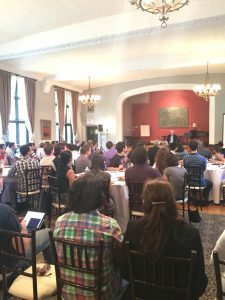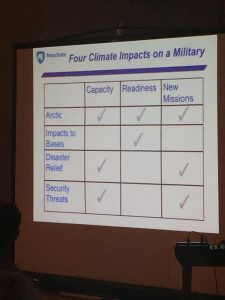Climate Risk and National Security: People not Polar Bears
On Thursday, September 22nd, the Initiative on Extreme Weather and Climate hosted its biggest seminar to date. To an audience of over 100 people, Dr. David Titley presented Climate Risk and National Security: People not Polar Bears. Titley, a retired Rear Admiral in the US Navy who is now a Professor of Practice in Meteorology at the Pennsylvania State University and the founding director of Penn State’s Center for Solutions to Weather and Climate Risk, engaged the audience for the span of his talk, bringing bits of humor to the serious topic of climate change and how it affects people in general as well as, more specifically, in the geopolitical sphere.
Titley narrowed reasons why we care about climate to three very general, but easily digestible ones: people, water and change. First, human life is impacted by our climate – it affects our food supply, our energy supply and our water supply. Second, from the dwindling supplies of freshwater to the acidification of the oceans to the melting ice in the Arctic, there are undeniable impacts on water as a direct result of climate. Finally, change is the most frightening of the three. Titley honed in on the idea that, since the dawn of human civilization, we have had a fairly good grasp on what the climate would be, allowing us to accurately anticipate the cold, the ice, the lack of sunlight, etc. But everything we thought we knew is changing and everything we have taken for granted is going to change. He drove the point home when he stated, “If climate changes faster than we can change, this is conflict – especially in areas where people are already struggling.”
Climate as a security risk is a concept that is widely examined. In fact, Obama just signed a memorandum telling the federal government that they need to integrate climate change in national security planning. Titley discussed several examples but honed in on two. First being Svalbard, Norway, a small island off the northeast coast of Greenland, so far north you can communicate with any polar orbiting satellite every 106-108 minutes as it completes its orbit. It is a research base that dates back to a World War I treaty that grants full sovereignty to Norway, but allows all signatory countries rights to fishing, hunting, mineral resources and use of the research facility. Last year, when the Russian Deputy Prime Minister showed up at Svalbard without first informing the Norwegians who found out about his visit from the media, geopolitical tension in the arctic grew, leading to a number of questions regarding U.S. involvement in the geopolitics of the region. Since Norway is part of North Atlantic Treaty Organization (NATO), how would the U.S. government respond if Russia started pushing in Svalbard?
The second example is how climate change forcing the drought in Syria – demonstrated by research done at Columbia – is one of the links in a chain of events that led to the Syrian war. Climate magnified and intensified the drought in Syria, thus influencing Assad’s political decisions. That, coupled with several other tensions in the area – including an influx of millions of refugees from the Iraq war – allowed for extremist groups like ISIS to gain power in the region. “We can’t say that climate caused ISIS, but here is a definite link between climate and geopolitics,” said Titley. Climate was one link, but it was there and broken and can lead to catastrophic outcomes.
Another major point woven throughout Titley’s talk was learning how to speak to people with different agendas. He stated explicitly that you need to learn to talk to people in a way that resonates with them. You have to learn how to bring things to them in a manner that they can relate to. He exemplified this when he spoke about how he presented climate change to a group of fellow Navy Admirals and he successfully drove his points home to them by using words such as “Capacity” and “Readiness” and very little mention of climate. He presented as encouraging news that disparate groups of people are now coming at climate change from different aspects, from the media to businesspeople to environmentalists to religious leaders – and everybody is ultimately reaching the conclusion that it is a serious issue requiring action. We need to adapt for the changes that are coming and we need to decarbonize our energy structure.
Titley’s final takeaway presented the U.S as having the opportunity to take the lead on climate change. “What America does counts at home and also abroad – when we get focused, we can do amazing things,” he proclaimed, “Incredible ingenuity together makes amazing things – we can scale that up and let America lead the way once we get focused.” There is so much resourcefulness, excitement and potential at the core of climate science that this is undeniably true.





Very informative piece, Jaclyn – thank you!